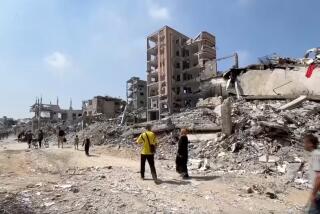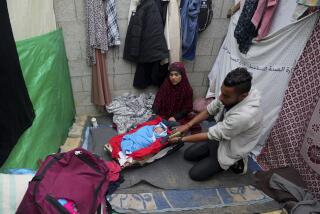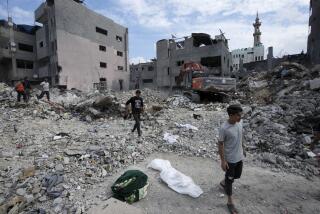U.S. Forces Report Progress in Baghdad, but Toll Still Climbs
- Share via
BAGHDAD — U.S. military authorities said Tuesday that they had seized five weapons caches and made more than 20 arrests in a two-week sweep aimed at taming two violent Shiite Muslim neighborhoods of east Baghdad, but within hours police said they had found two more corpses in the district.
The two victims were among 19 bodies dumped in and around the capital -- most of them blindfolded, handcuffed, shot and sometimes tortured -- on a day that also saw 11 bombings and several mortar attacks across Iraq.
“This operation reduced the amount of violence in this specific area. It increased the perception of security, and set the conditions for Iraqi forces to ... improve essential services for the people,” said Col. Michael Shields, commander of the 172nd Stryker Brigade Combat Team that undertook the operation, along with Iraqi forces, in Baghdad’s Shaab and Ur neighborhoods.
“But military means alone cannot defeat the insurgency or the militia killing teams,” Shields said.
“It will take the support of the people, and the government of Iraq.”
American authorities have postponed the drawdown of U.S. troops, extended tours and moved additional forces into Baghdad in an effort to stem violence between Shiites and Sunni Arabs. The fighting has left much of the capital far more dangerous than when U.S.-led forces first moved to topple the government of President Saddam Hussein or during the first wave of the pro-Hussein insurgency in 2003.
A total of 15,000 troops have been assigned to back up the Iraqi army and police in a series of house-to-house searches. Officials say the raids are to be followed by efforts to restore electricity and repair health clinics.
Since June, when the first neighborhood sweeps began, there have been mixed results. In the Dora district, dozens of bombs were found after troops left, and in Adhamiya, new checkpoints around the perimeter have come under repeated attack.
In Shaab and Ur, strongholds of the Shiite Muslim Al Mahdi army, Stryker Brigade teams working with Iraqi troops and police have searched 36,000 buildings and 23 mosques since Sept. 14, looking for weapons.
“The majority of the people are happy to see us and look forward to better security in this area. They are tired of the militia violence, the kidnappings and murders,” Shields said.
In Adhamiya, swept by troops this summer, some residents said shops and cafes were able to remain open into the early evening. But in Shaab, one 29-year-old shopkeeper said Al Mahdi forces feared by many residents simply went into hiding during the sweeps.
“The American forces were coming in the morning and breaking into the shops without taking permission of the shop owners. And they didn’t find a single bullet,” said the man, who would give only his first name, Mohammed.
“When they came to my shop, I was playing video games with my PlayStation. And one of the Americans asked if he could play with me. And we played together.”
If residents have felt safer over the last few weeks, he said, it is because they have banded together on their own, erecting concrete barriers to keep out cars and prohibiting unknown vehicles from entering the neighborhood.
On Tuesday, five people were killed and 11 wounded by a car bomb and roadside bomb near the Communist Party headquarters in the Zayona district of Baghdad. And a bomb attached to a booby-trapped body exploded in the Dora district, injuring four police officers who came to investigate.
A booby-trapped motorcycle killed four civilians outside a Baghdad restaurant shortly before noon.
And in Baqubah, northeast of Baghdad, seven members of a family were killed and two were injured early today when a mortar round hit the garden of their house. The attack happened hours after U.S. forces searched houses in the neighborhood in the Qatoun district of the city.
Clashes that authorities believe were between Al Mahdi militiamen and Sunni tribesmen killed three and wounded 10 in the Bayaa district of the capital.
In the northern city of Kirkuk, three car bomb attacks killed two and wounded at least nine. A roadside bomb killed five in Baqubah, and several other bombs, mostly in Baghdad, resulted in injuries but no deaths.
In another development, Hussein was ejected from the courtroom for a third straight day in his trial on capital charges stemming from attacks on Kurds in northern Iraq in the 1980s.
After a heated exchange with the judge, who refused to allow political diatribes in court, Hussein proceeded to read a 20-minute statement that could be heard by no one but the attorneys after the judge switched off the courtroom microphones.
“If this is the justice you judge with, damn this justice,” Hussein declared at one point.
“I warned you against using bad words. Don’t use bad words,” the judge replied.
The trial was adjourned until Oct. 9.
*
*
Special correspondents in Kirkuk, Baqubah and Baghdad contributed to this report.
More to Read
Sign up for Essential California
The most important California stories and recommendations in your inbox every morning.
You may occasionally receive promotional content from the Los Angeles Times.













